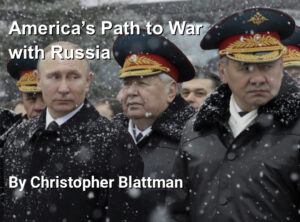Teaching Why We Fight
Why We Fight boils down decades of social science into an accessible, readable book to teach students about war, peace, and the path to successful societies.
- Don’t see what you’re looking for? Reach out to me. I’m developing materials.
- Please send me your syllabi, assignments & comments! I’d love to include them here.
Sample syllabi, assignments & slides, by level
Applying the book to contemporary cases



How to cut short the long slog in Ukraine
August 14, 2022

America’s Path to War With Russia
July 9, 2022


The Strategic Logic of Russia’s War on Ukraine
April 28, 2022


Why I do not expect a civil war in America (and what does worry me)
January 31, 2022
Instructor endorsements
I use Why We Fight in my undergrad international development class, an intro-level course in an interdisciplinary major. Students love it, both the ideas and because the anecdotes gave them a sense of how development work and research are conducted. I’ve enjoyed it a lot myself.

I organized my graduate class at Harvard around Why We Fight. We read a chapter a week along with related articles. The great thing about teaching the book is that it organizes an interdisciplinary literature on why violence does and does not occur at every level of analysis—from interstate war to civil wars to street gangs. It clearly articulates theories of war and shows how a host of literatures—both "rationalist" and “behavioral"—can be synthesized within its framework.

Students will benefit from the way that Blattman organizes a vast literature. I would wholeheartedly recommend this as *the* book for those either starting war studies or working in relevant fields.
Cyrus SamiiProfessor of political science, NYU
My students love the book. One thing that jumps out is how clearly Blattman writes. For high school students who are encountering a big topic for the first time, clarity is incredibly important. The book really speaks to a wide audience.
Matt ConeTeacher, Carrboro High School, Carrboro, North Carolina
"Humanity is still mired in wars and deadly conflicts. Avoiding the useless dichotomies that either claim violence is an inseparable part of human nature or declare that humanity has all but conquered its proclivity to war, Blattman explains how human communities make use of many different strategies to resolve conflicts, and why these efforts sometimes stumble."

“Blattman is the go-to social scientist on war. His insights are essential reading.”
William Easterlyauthor of The White Man’s Burden and The Tyranny of Experts
“Economists imagine that people in poor countries wake up every day worrying that they are poor. Maybe, but more fundamentally they are insecure and subject to violence. Foregrounding this most basic human problem is essential for understanding the world we live in today.”
James A. RobinsonUniveristy of Chicago and author of Why Nations Fail
“Why We Fight not only reflects Blattman’s expertise in economics, political science, and history, it also introduces us an intriguing range of characters and locations. We meet a warlord from Liberia called White Flower, and in the same chapter learn why George Washington became America’s wealthiest President. Blattman is a great storyteller, with important insights for us all.”
Richard Thalerwinner of the Nobel Prize and co-author of Nudge



